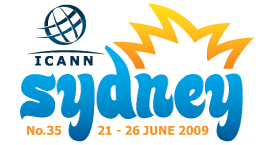Schedule: ccNSO
Monday, 22 June 2009
What it is | Technical Workshop, with presentations, discussions and hands-on demonstrations in an interactive format.
Why it's important | Present day operational issues and challenges will be discussed and practical solutions in place at ccTLD Registries will be demonstrated.
Who should attend? | Technical staff and management from ccTLD registries, in particular small and emerging ones, but also developers and gNSO Registries.
What it is | A briefing session for ccTLD managers and their staff new to ICANN meetings or who have not attended for some time.
Why it's important | To properly participate in the various sessions being run by the ccNSO, attendees may wish to be briefed on history and background.
Who should attend? | ccTLD managers and their staff.
Tuesday, 23 June 2009
What it is | The Country-Code Names Supporting Organisation (ccNSO) which helps develop global policy for country code Top-Level Domains (ccTLDs), convenes both a members meeting and a Council meeting in Sydney.
Why it's Important | The Council and Members will discuss a number of issues affecting a cross-section of the world's country codes. Additionally there will be updates on developments and best practice from various ccTLD managers.
Who should attend? | Anyone with an interest in ccTLD issues specifically, and the Domain Name System in general, including registrars, registries, businesses, Internet Service Providers, Internet users, and government representatives.
What it is | Support for characters from local languages in domain name registration submission and display is an issue that affects many ICANN stakeholders, including the GNSO, CCNSO, ALAC and GAC. Collaboration across this large, diverse community is vital to defining a suitable, scalable solution. SSAC has recently published SAC037 that examines how the use of characters from local scripts affects the Internet user experience with respect to domain name registration data submission, usage, and display. In this session we will have open discussion of the recommendations in SAC037 and related issues.
Why it's Important | Many Internet applications today support characters from local languages, alphabets or scripts. Domain names are poised to fully support this emerging and much-needed “internationalisation” as well. It is only natural that users will want to use characters from local scripts when they submit and view Registration Data associated with a domain name.
Who should attend? | Registrars, registries, and other third parties who need to examine and understand the issues related to supporting characters from local scripts in the context of current and future applications that provide for the submission, usage and display of domain names and Registration Data.
Wednesday, 24 June 2009
Summary of input to meeting
This summarizes public input into the broad topics outlined by the committee.
Document deadlines
- The deadlines were very helpful
- It would helpful to include meeting agendas as part of that deadline
- Need to consider how to avoid overloading people with the number of documents
- Expectation that earlier provision of documents will mean fewer presentations at meetings about a report, and more discussion of a report
- Documents themselves are too long and complex – acts as a barrier to entry
Language
- There is a significant need for documents in plain language
- Need to present fewer acronyms, and to provide explanation of acronyms when they do appear (a glossary on each document?)
- Translations of documents need to be made more easily and readily available (and supporting documentation also needs to be translated)
- Translations of documents need to be provided to the same document deadlines
Meetings
- Three meetings a year around the globe make participation difficult (time and cost)
- Consider reducing the number of meetings
- Consider the use of a hub city for meetings
- Look at expanding/improving remote participation
- Need more information about meeting agendas to entice people
- There’s not been a meeting in North America for some time
Public comment process
- Too many public comment periods (have different types?)
- Consider having a rule that no public comment periods will be open during a meeting (as people don’t have time to review or respond)
What it is | The Board Committee on Public Participation is holding an open session to ask the community what it thinks about a number of new ideas for improving participation within ICANN, plus to allow the community to make their own suggestions.
Why it's Important | Participation is an important issue for ICANN as an organization. This is an opportunity for community members to enter into free and open discussion about what improvements could be made with Board members.
Who should attend? | All those interested in improving participation within ICANN.
What it is | The Country-Code Names Supporting Organisation (ccNSO) which helps develop global policy for country code Top-Level Domains (ccTLDs), convenes both a members meeting and a Council meeting in Sydney.
Why it's Important | The Council and Members will discuss a number of issues affecting a cross-section of the world's country codes. Additionally there will be updates on developments and best practice from various ccTLD managers.
Who should attend? | Anyone with an interest in ccTLD issues specifically, and the Domain Name System in general, including registrars, registries, businesses, Internet Service Providers, Internet users, and government representatives.
What it is | The Country-Code Names Supporting Organisation (ccNSO) which helps develop global policy for country code Top-Level Domains (ccTLDs), convenes both a members meeting and a Council meeting in Sydney.
Why it's Important | The Council and Members will discuss a number of issues affecting a cross-section of the world's country codes.
Additionally there will be updates on developments and best practice from various ccTLD managers.
Who should attend? | Anyone with an interest in ccTLD issues specifically, and the Domain Name System in general, including registrars, registries, businesses, Internet Service Providers, Internet users, and government representatives.













